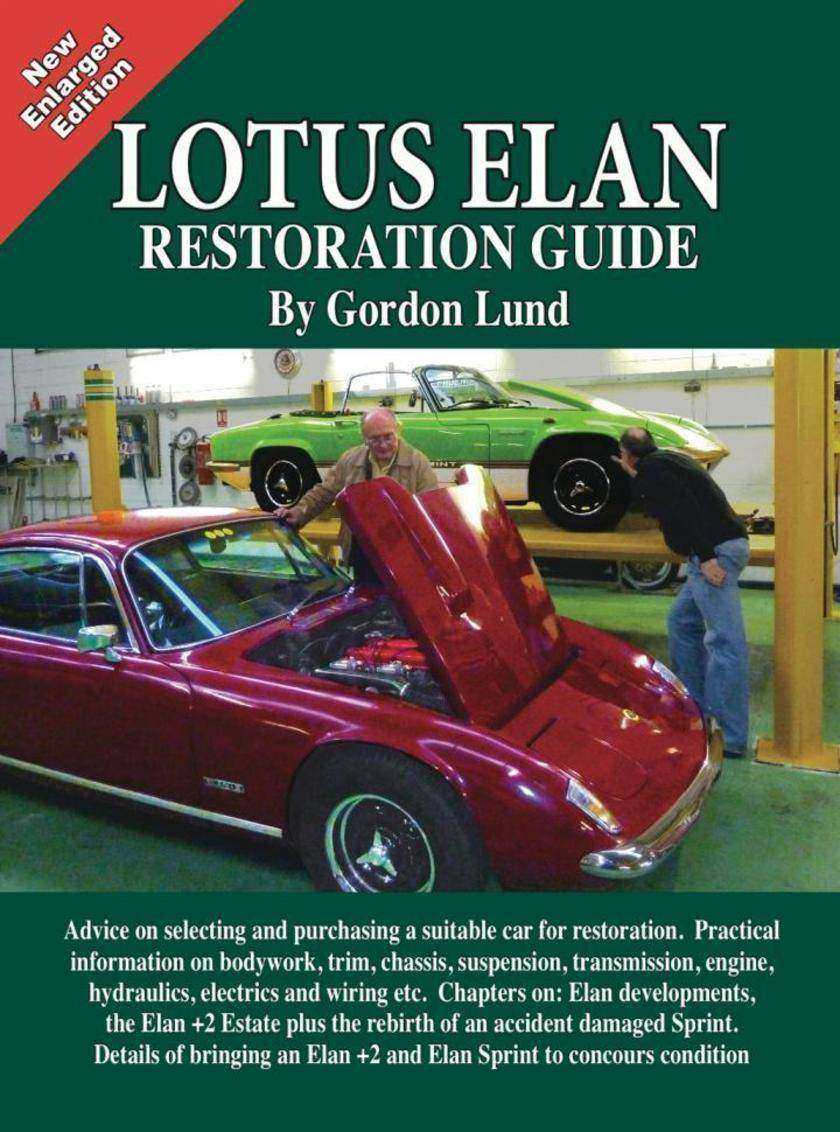
Lotus Elan - A Restoration Guide
¥245.17
The story of restoring an Elan +2 and Elan Sprint to concours edition. Advice on how to purchase a suitable car for restoration plus detailed practical information on preparing bodywork, trim, chassis, suspension, wheels, hydraulics, engine, electrics & wiring etc. 24 Chapters, plus appendices, give information on chassis changing, body restoration, including Elan +2 sills, rebuilding the Lotus/Ford Twin Cam engine, electrics including fitting a new loom, insight to tuning and running in, Elan developments, a remarkable Elan +2 Estate, rebirth of an accident damaged Sprint.

Mercedes E Class Petrol Workshop Manual W210 & W211 Series
¥245.17
This Owners Edition Workshop Manual covers the Mercedes-Benz E Class Diesel W210 & W211 Series from 2000 to 2006, fitted with the 1.8, 2.0, 2.6, 2.8, 3.2, 3.5, 4.3 & 5.0 Litre, 111, 112, 113, 271 & 272, with four, six & eight cylinder petrol engine. It has been specially written for the practical owner who wants to maintain a vehicle in first-class condition and carry out the bulk of his or her own servicing and repairs. Comprehensive step-by-step instructions are provided for service and overhaul operations to guide the reader through what might otherwise be unfamiliar and complicated tasks. Numerous drawings are included to amplify the text. With 190 pages, well illustrated.
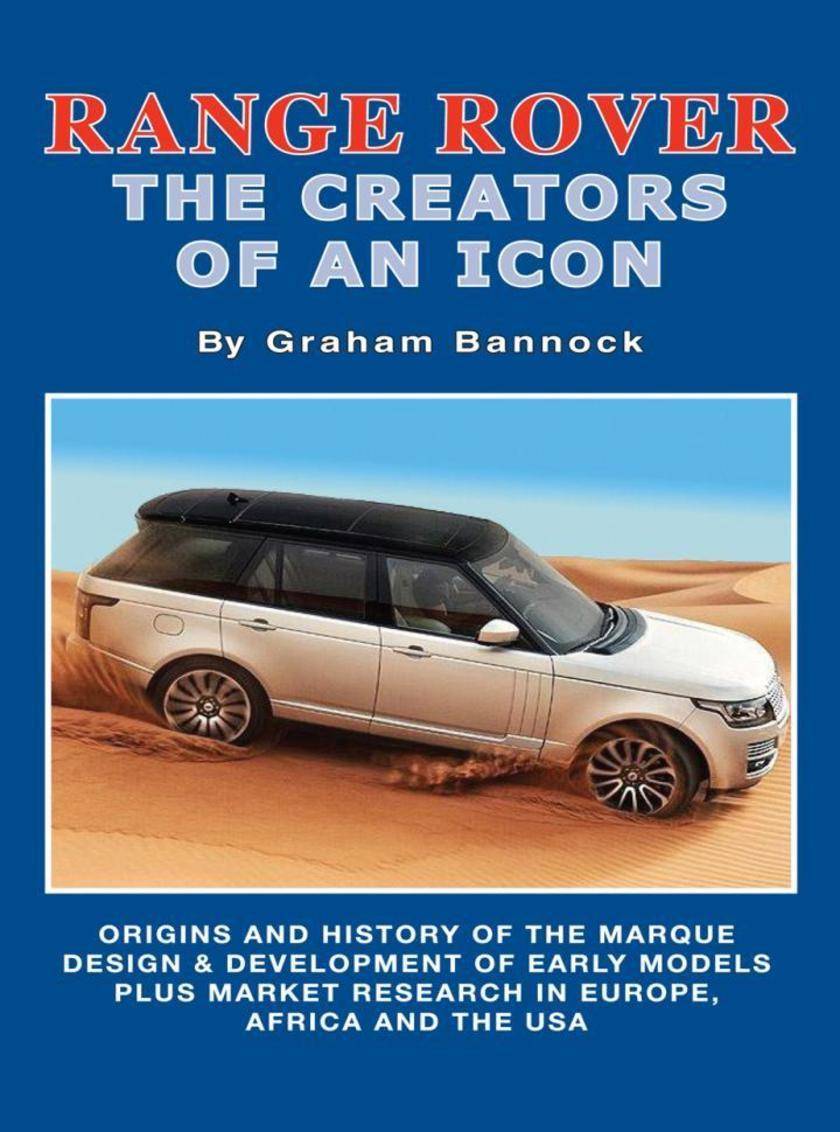
Range Rover The Creators of an Icon
¥245.17
Origins and history of the Range Rover marque, design and development of early models plus market research in Europe, Africa and the USA. A personal memoir by, author, Graham Bannock, of his time with the Rover Company in the late 1950s and the 1960s, which was the time the Range Rover was under development. Contents: Introduction; The Pearl in the Oyster: Origins of the Range Rover; Earlier History; How it was: Solihull in the 1960s; Across Africa: I The Sudan; Across Africa: II Ethiopia: Travels in North America, Europe and Africa; Renaissance - Appendix I: Rover's Finances by Graham Bannock and Alan Doran; Appendix II: Rover Gas Turbines by Graham Bannock and James Taylor; Appendix III - Internal memoranda; Bibliography.

Restoring Sprite & Midgets
¥245.17
Whenever I see a rebuild guide I am impressed by how easy everything looks - every job seems to be so straightforward. Not surprisingly, since they have been written by seasoned professionals who have all the tools, own large workshops and have worked on the same cars for years.
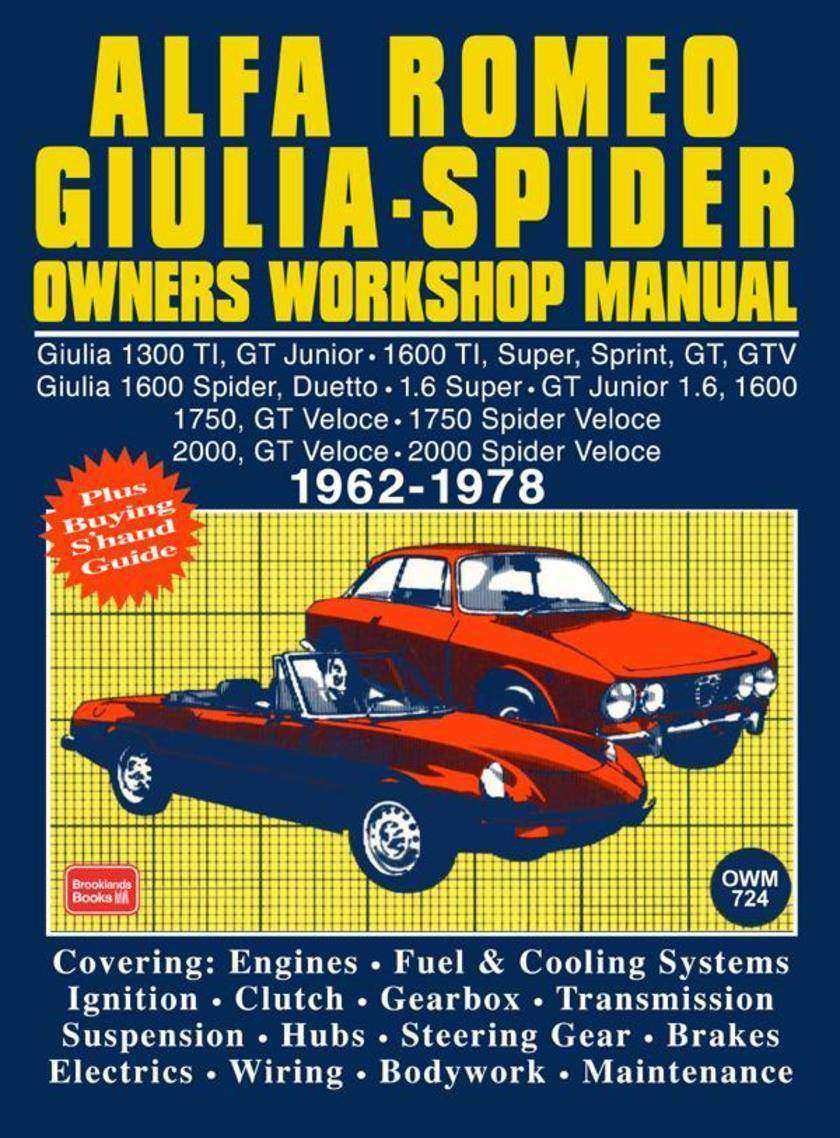
The Alfa Romeo Spider Owners Work Manual
¥245.17
This is a do it ourself workshop manual, it was written for the owner who wishes to maintain his vehicle & carry out the bulk of his own servicing & repairs. Step by step instructions are given of most dismantling, overhauling & assembling operations. Covers Giulia 1300TI, GT Junior 1967-1972, Giulia 1600TI, Super 1962-1972, Giulia 1600 Sprint GT, GTV 1963-1968, Giulia 1600 Spider, Duetto 1962-1968, Giulia 1.6 Super 1972-1975, GT Junior 1.6 1972-1975, GT Junior 1600 1975-1976, 1750 GT Veloce 1968-1972, 1750 Spider Veloce 1968-1972, 2000 GT Veloce 1971-1975, 2000 Spider Veloce 1971-1978. A total of 168 fully illustrated pages. SB.
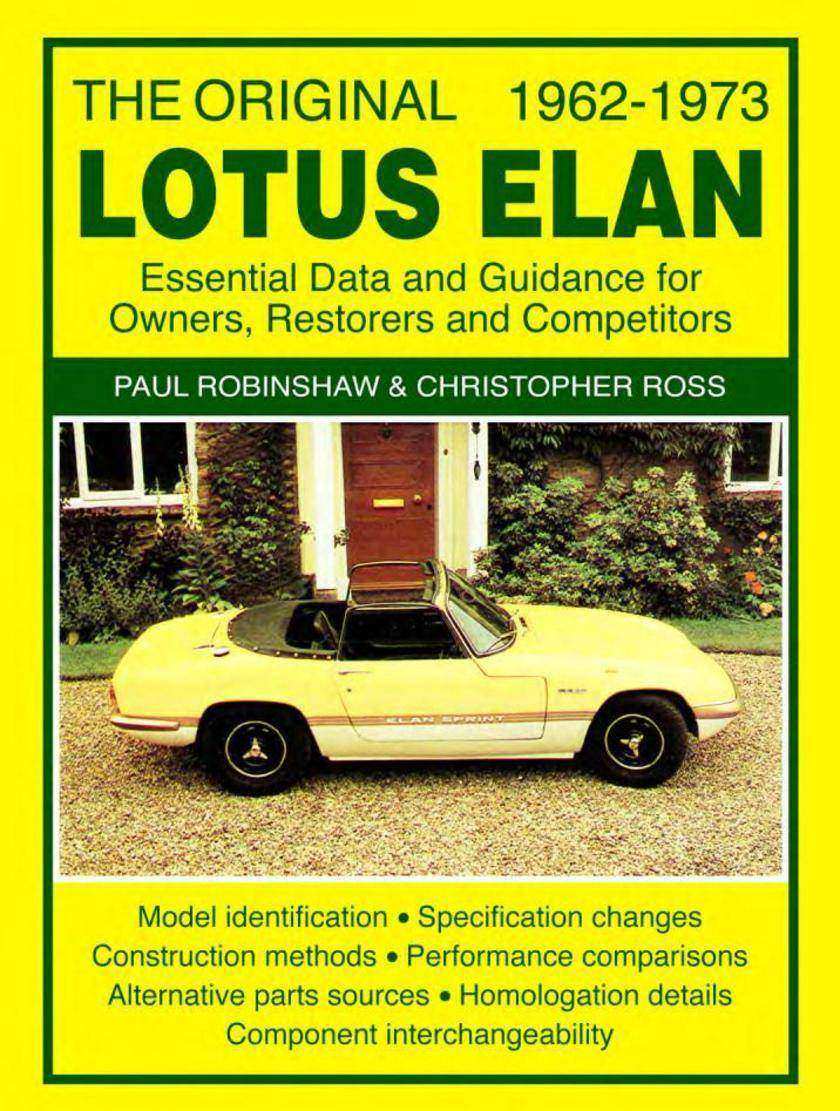
The Original Lotus Elan
¥245.17
This book contains a variety of information, both of a practical nature and otherwise, including the identification of alternative equivalent parts sources, which is applicable to all Lotus Elan 1500/1600 models as well as S2, S3, S4 and Sprint derivatives, produced between the years 1962 and 1973.

VW Transporter T4 Workshop Manual Diesel 2000-2004
¥245.17
Covers all T4 diesel vehicles from 2000 to the end of 2004, including Vans 800, 1,000, and 1,200, Caravelle CL and GL, Bus (long and short wheelbase). Engines covered: Diesel 1.9L, 2.4L & 2.5L TDI, with a manual gearbox only. 164 large pages including 11 pages of wiring & over 200 illustrations.

Galveston Architecture: A Visual Journey
¥245.17
Galveston Architecture: A Visual Journey is a photographic journey of the architecture and history of select 100 buildings in Galveston, Texas, with photographs by Pino Shah, World Heritage Photographer and narratives by Galveston Historical Foundation (GHF). The book includes full illustrations of 100 buildings re ecting Greek Revival, Victorian, Italianate and Mid-century Modern architectural styles from 1840s through 1990s. Pino Shah is a world heritage photographer based in McAllen, Texas and Ahmedabad, India. Galveston Historical Foundation preserves and revitalizes the architectural, cultural and maritime heritage of Galveston Island. The Foundation is a 501 (c) (3) non-pro t charitable corporation.

First Class Phonics - The Complete Course
¥245.15
First Class Phonics is a series of books designed to help children quickly become proficient readers and writers by using Synthetic Phonics, a high-quality teaching method recognised all over the world. In Synthetic Phonics, children focus on the skills that enable them to read and spell words accurately. It is essential that children develop the ability to hear, identify and manipulate individual sounds in order to read fluently.The eight books in the series provide a complete reading programme in which children are taught to recognise the importance of every sound they hear in the spoken word and learn to blend these sounds so that they can read words from the very beginning of the program.Children progress from blending simple single sounds in Book One to using digraphs (two letter sounds) and trigraphs (three letter sounds) in later books. In the earlier books children are taught one letter or letter group for each sound but are gradually introduced to different groups of letters that make the same sound as well as the different sounds that can be made from an identical group of letters.Children are also taught words that they cannot initially 'sound out' as 'tricky words' that are learnt by sight. As children learn the different sounds that a group of letters can make these words cease to be 'tricky words'.With lots of fun activities to reinforce learning in each book and a complete story in which children practice the skills they have learnt children quickly become fluent readers with a love for books.
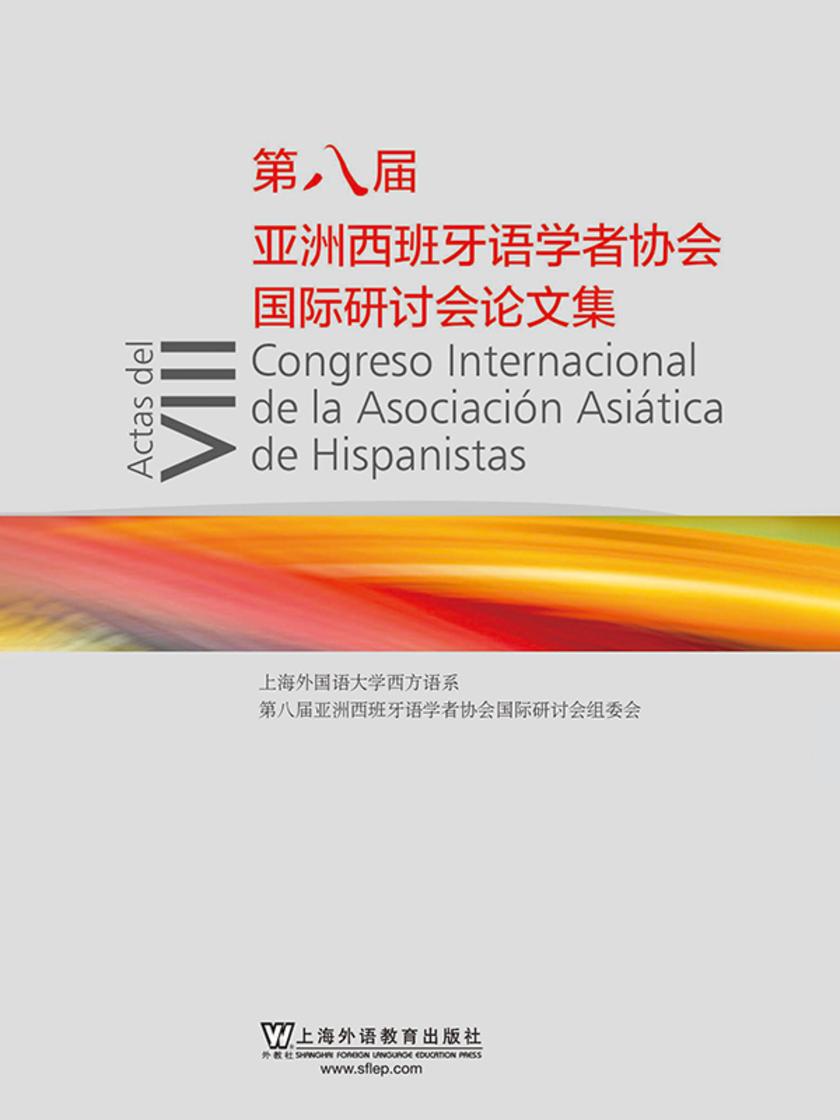
第八届亚洲西班牙语学者协会国际研讨会论文集
¥245.00
-------------------------------------------------

Scars of Project 459
¥243.09
The Scars of Project 459 tells the environmental story of the Lake of the Ozarks, built by the Union Electric Company in 1931. At 55,000 acres, the lake was the biggest manmade lake in the United States at the time of its completion, and it remains the biggest in the Midwest, with 1,100 miles of shoreline in four different Missouri counties. Though created to generate hydroelectric power, not for development, the "e;Magic Dragon,"e; as it is popularly known because of its serpentine shape, has become a major recreational area. Located in some of the most spectacular Ozark scenery, the giant lake today attracts three million visitors annually and has more than 70,000 homes along its shoreline. Traci Angel shows how the popularity of the Lake of the Ozarks has resulted in major present-day problems, including poor water quality, loss of habitat, and increasing concerns about aging waste-management systems for the homes surrounding the lake. Many in the area, especially business owners whose incomes depend on tourism, resist acknowledging these problems. The Scars of Project 459 aims to make public the challenges facing this important resource and ensure that its future is not to be loved to death.

Honest Courtesan
¥241.33
The Venetian courtesan has long captured the imagination as a female symbol of sexual license, elegance, beauty, and unruliness. What then to make of the cortigiana onesta-the honest courtesan who recast virtue as intellectual integrity and offered wit and refinement in return for patronage and a place in public lifeVeronica Franco (1546-1591) was such a woman, a writer and citizen of Venice, whose published poems and familiar letters offer rich testimony to the complexity of the honest courtesan's position.Margaret F. Rosenthal draws a compelling portrait of Veronica Franco in her cultural social, and economic world. Rosenthal reveals in Franco's writing a passionate support of defenseless women, strong convictions about inequality, and, in the eroticized language of her epistolary verses, the seductive political nature of all poetic contests. It is Veronica Franco's insight into the power conflicts between men and women-and her awareness of the threat she posed to her male contemporaries-that makes her literary works and her dealings with Venetian intellectuals so pertinent today.Combining the resources of biography, history, literary theory, and cultural criticism, this sophisticated interdisciplinary work presents an eloquent and often moving account of one woman's life as an act of self-creation and as a complex response to social forces and cultural conditions."e;A book . . . pleasurably redolent of Venice in the 16th-century. Rosenthal gives a vivid sense of a world of salons and coteries, of intricate networks of family and patronage, and of literary exchanges both intellectual and erotic."e;-Helen Hackett, Times Higher Education SupplementThe Honest Courtesan is the basis for the film Dangerous Beauty (1998) directed by Marshall Herskovitz. (The film was re-titled The Honest Courtesan for release in the UK and Europe in 1999.)

Fiela's Child
¥241.33
Set in nineteenth-century rural Africa, Fiela's Child tells the gripping story of Fiela Komoetie and a white, three-year old child, Benjamin, whom she finds crying on her doorstep. For nine years Fiela raises Benjamin as one of her own children. But when census takers discover Benjamin, they send him to an illiterate white family of woodcutters who claim him as their son. What follows is Benjamin's search for his identity and the fundamental changes affecting the white and black families who claim him."e;Everything a novel can be: convincing, thought-provoking, upsetting, unforgettable, and timeless."e;-Grace Ingoldby, New Statesman"e;Fiela's Child is a parade that broadens and humanizes our understanding of the conflicts still affecting South Africa today."e;-Francis Levy, New York Times Book Review"e;A powerful creation of time and place with dark threads of destiny and oppression and its roots in the almost Biblical soil of a storyteller's art."e;-Christopher Wordsworth, The Guardian"e;The characters in the novel live and breathe; and the landscape is so brightly painted that the trees, birds, elephants, and rivers of old South Africa are characters themselves. A book not to miss."e;-Kirkus Reviews

Making Gray Gold
¥241.33
This first hand report on the work of nurses and other caregivers in a nursing home is set powerfully in the context of wider political, economic, and cultural forces that shape and constrain the quality of care for America's elderly. Diamond demonstrates in a compelling way the price that business-as-usual policies extract from the elderly as well as those whose work it is to care for them.In a society in which some two million people live in 16,000 nursing homes, with their numbers escalating daily, this thought-provoking work demands immediate and widespread attention."e;[An] unnerving portrait of what it's like to work and live in a nursing home. . . . By giving voice to so many unheard residents and workers Diamond has performed an important service for us all."e;-Diane Cole, New York Newsday"e;With Making Gray Gold, Timothy Diamond describes the commodification of long-term care in the most vivid representation in a decade of round-the-clock institutional life. . . . A personal addition to the troublingly impersonal national debate over healthcare reform."e;-Madonna Harrington Meyer, Contemporary Sociology
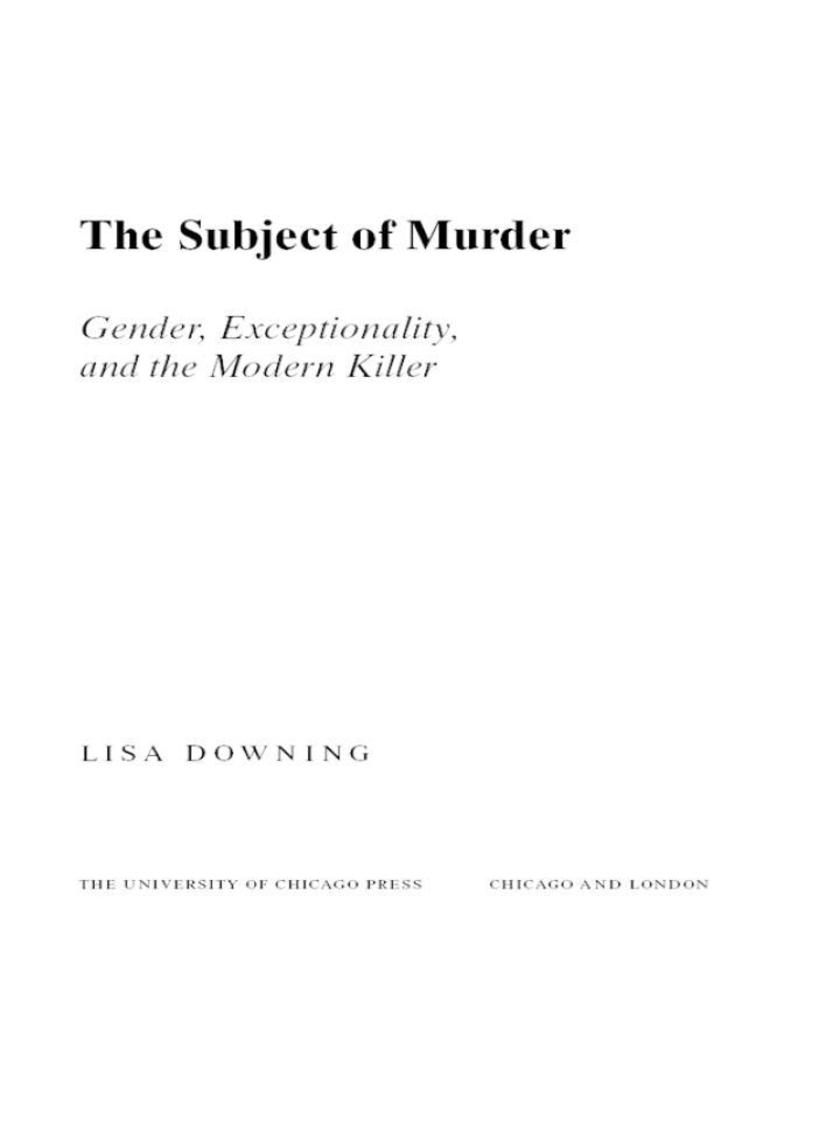
Subject of Murder
¥241.33
The subject of murder has always held a particular fascination for us. But, since at least the nineteenth century, we have seen the murderer as different from the ordinary citizen-a special individual, like an artist or a genius, who exists apart from the moral majority, a sovereign self who obeys only the destructive urge, sometimes even commanding cult followings. In contemporary culture, we continue to believe that there is something different and exceptional about killers, but is the murderer such a distinctive typeAre they degenerate beasts or supermen as they have been depicted on the page and the screenOr are murderers something else entirely?In The Subject of Murder, Lisa Downing explores the ways in which the figure of the murderer has been made to signify a specific kind of social subject in Western modernity. Drawing on the work of Foucault in her studies of the lives and crimes of killers in Europe and the United States, Downing interrogates the meanings of media and texts produced about and by murderers. Upending the usual treatment of murderers as isolated figures or exceptional individuals, Downing argues that they are ordinary people, reflections of our society at the intersections of gender, agency, desire, and violence.
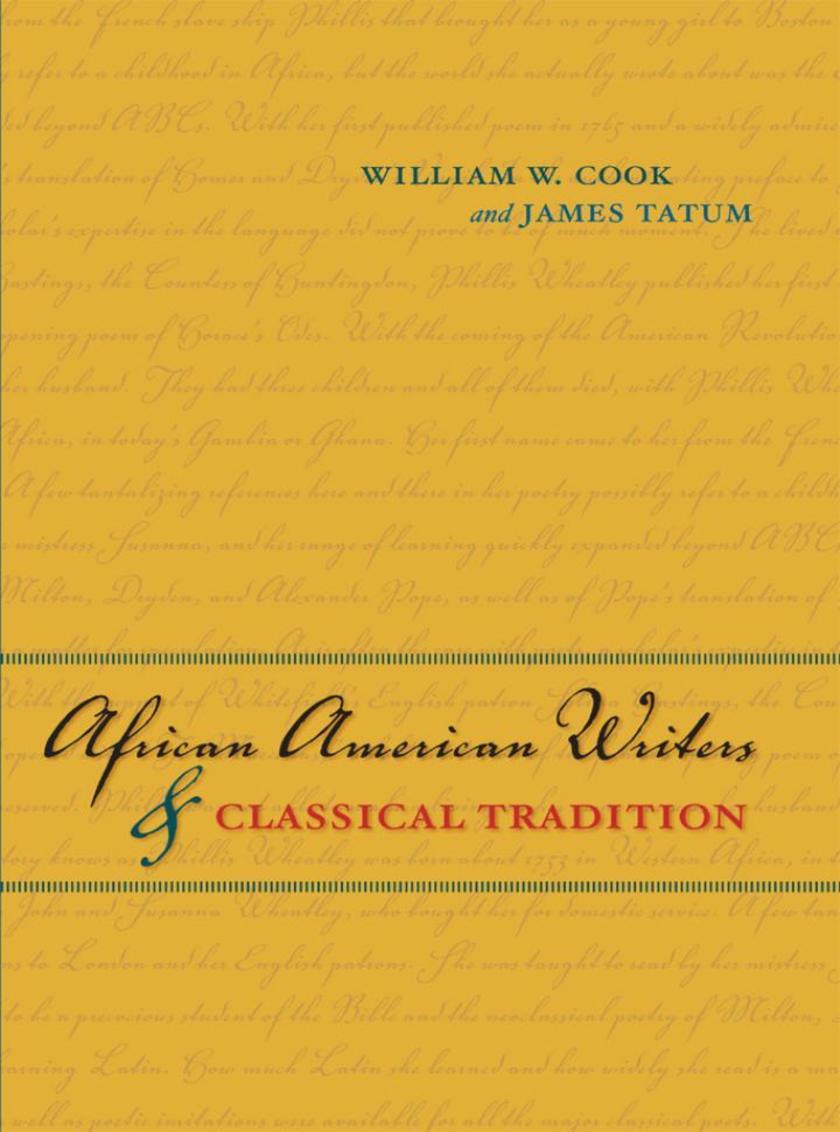
African American Writers and Classical Tradition
¥241.33
Constraints on freedom, education, and individual dignity have always been fundamental in determining who is able to write, when, and where. Considering the singular experience of the African American writer, William W. Cook and James Tatum here argue that African American literature did not develop apart from canonical Western literary traditions but instead grew out of those literatures, even as it adapted and transformed the cultural traditions and religions of Africa and the African diaspora along the way.Tracing the interaction between African American writers and the literatures of ancient Greece and Rome, from the time of slavery and its aftermath to the civil rights era and on into the present, the authors offer a sustained and lively discussion of the life and work of Phillis Wheatley, Frederick Douglass, Ralph Ellison, and Rita Dove, among other highly acclaimed poets, novelists, and scholars. Assembling this brilliant and diverse group of African American writers at a moment when our understanding of classical literature is ripe for change, the authors paint an unforgettable portrait of our own reception of "e;classic"e; writing, especially as it was inflected by American racial politics.

Wittgenstein's Ladder
¥241.33
Marjorie Perloff, among our foremost critics of twentieth-century poetry, argues that Ludwig Wittgenstein provided writers with a radical new aesthetic, a key to recognizing the inescapable strangeness of ordinary language. Taking seriously Wittgenstein's remark that "e;philosophy ought really to be written only as a form of poetry,"e; Perloff begins by discussing Wittgenstein the "e;poet."e; What we learn is that the poetics of everyday life is anything but banal."e;This book has the lucidity and the intelligence we have come to expect from Marjorie Perloff.-Linda Munk, American Literature"e;[Perloff] has brilliantly adapted Wittgenstein's conception of meaning and use to an analysis of contemporary language poetry."e;-Linda Voris, Boston Review"e;Wittgenstein's Ladder offers significant insights into the current state of poetry, literature, and literary study. Perloff emphasizes the vitality of reading and thinking about poetry, and the absolute necessity of pushing against the boundaries that define and limit our worlds."e;-David Clippinger, Chicago Review"e;Majorie Perloff has done more to illuminate our understanding of twentieth century poetic language than perhaps any other critic. . . . Entertaining, witty, and above all highly original."e;-Willard Bohn, Sub-Stance
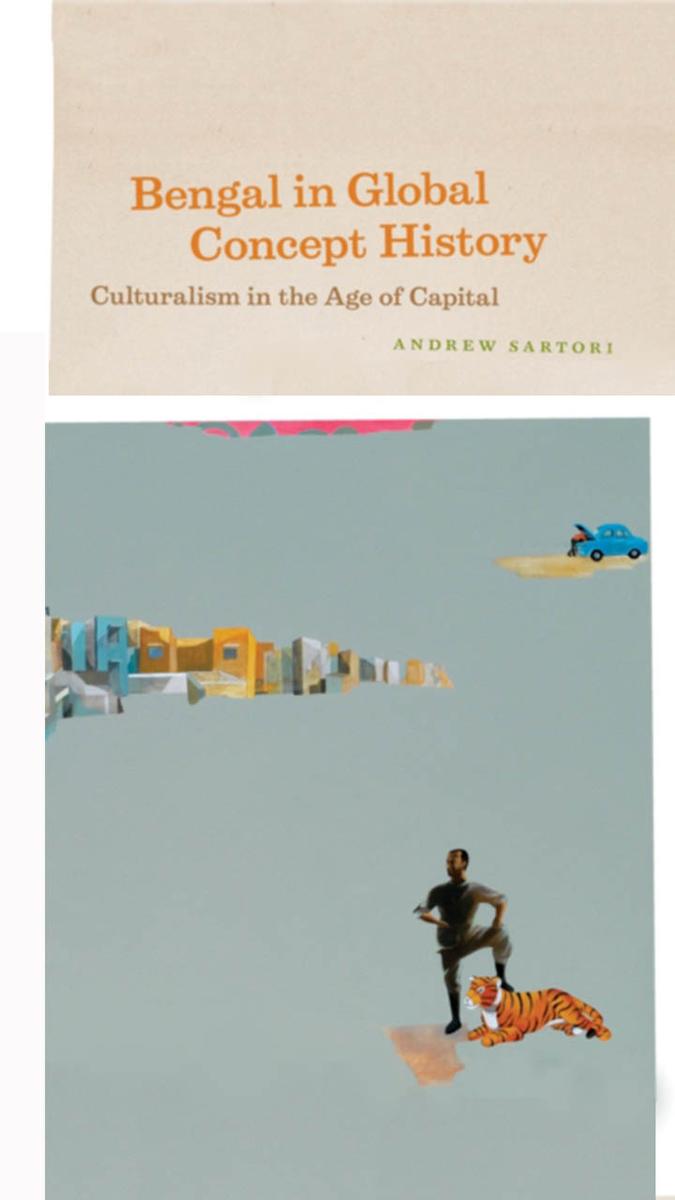
Bengal in Global Concept History
¥241.33
Today people all over the globe invoke the concept of culture to make sense of their world, their social interactions, and themselves. But how did the culture concept become so ubiquitousIn this ambitious study, Andrew Sartori closely examines the history of political and intellectual life in nineteenth- and twentieth-century Bengal to show how the concept can take on a life of its own in different contexts. Sartori weaves the narrative of Bengal's embrace of culturalism into a worldwide history of the concept, from its origins in eighteenth-century Germany, through its adoption in England in the early 1800s, to its appearance in distinct local guises across the non-Western world. The impetus for the concept's dissemination was capitalism, Sartori argues, as its spread across the globe initiated the need to celebrate the local and the communal. Therefore, Sartori concludes, the use of the culture concept in non-Western sites was driven not by slavish imitation of colonizing powers, but by the same problems that repeatedly followed the advance of modern capitalism. This remarkable interdisciplinary study will be of significant interest to historians and anthropologists, as well as scholars of South Asia and colonialism.
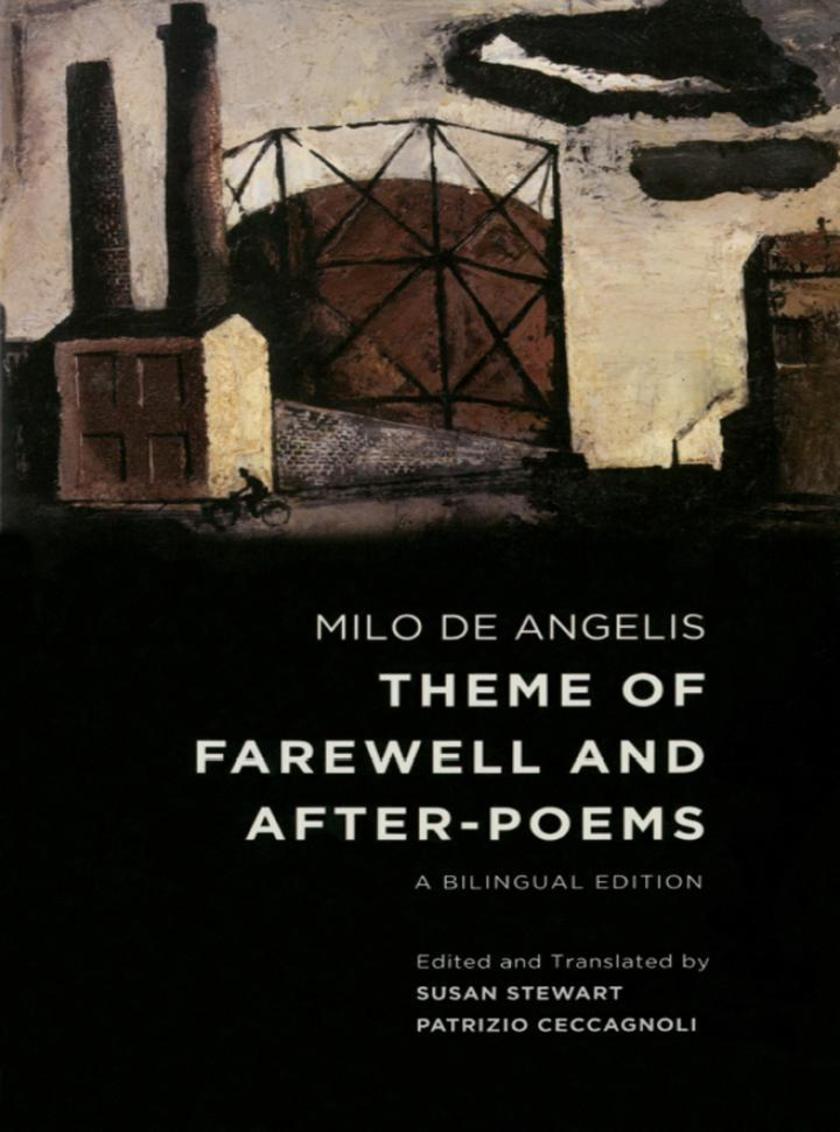
Theme of Farewell and After-Poems
¥241.33
Milo De Angelis, born in 1951, is one of the most important living Italian poets. With this volume, Susan Stewart and?Patrizio Ceccagnoli bring to English readers for the first time a facing-page edition of his most recent work: his book-length elegy,?Theme of Farewell, and the subsequent poems of That Wandering in?the Darkness of Courtyards. These two books form a sequence narrating the illness and premature death, in 2003, of the poet's wife, the writer Giovanna Sicari, a celebrated poet in her own right; they also trace De Angelis's turn from grief, through time, back to the world. Immediate, perceptive, and woven from the fabric of everyday life in contemporary Milan, the poems never depart from universal human emotions of despair and awakening. Throughout his long career, De?Angelis has renewed lyric poetry with the sheer intensity of his forms and insights, and the volumes offered here have won some of the most important Italian literary awards, including the coveted Premio Viareggio.?These inexorable and beautifully crafted translations will be of interest to scholars of contemporary Italian literature, students?of contemporary poetry and literary translation, and those who work in comparative literature. Above all, they are bound to speak to any reader in search of a poet writing at the height of his powers of expression.
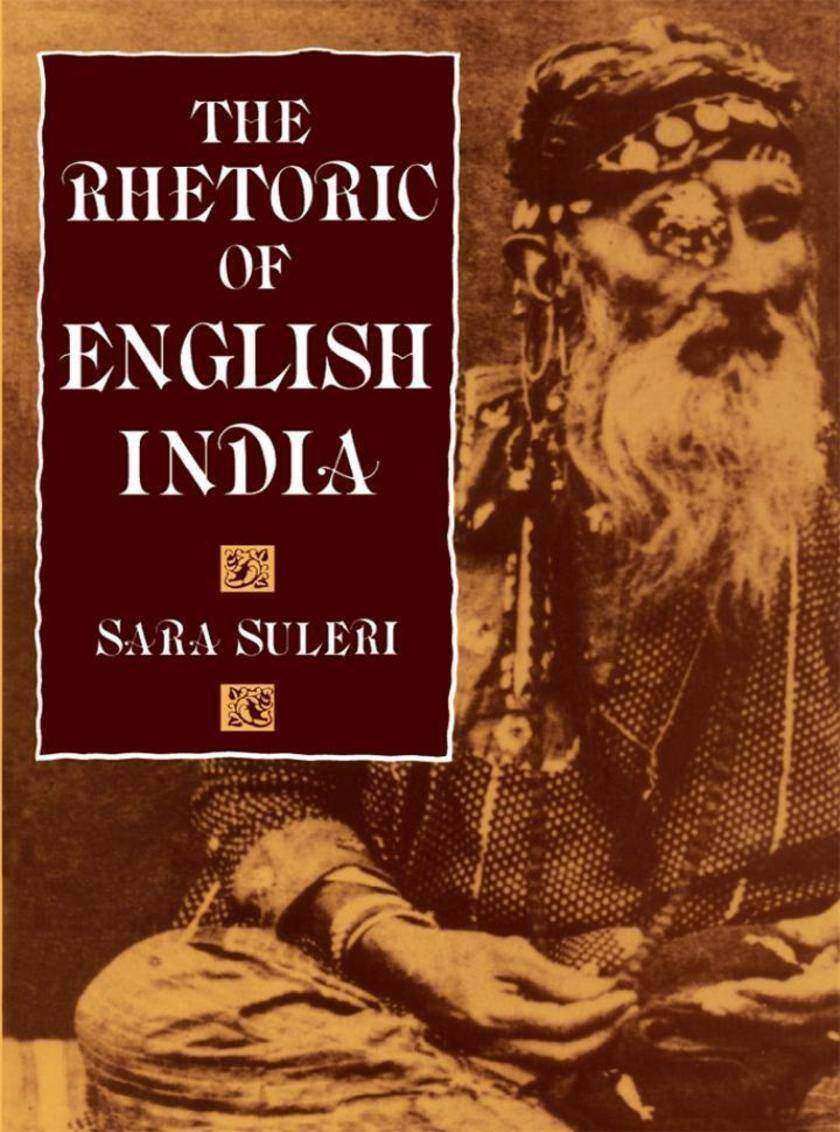
Rhetoric of English India
¥241.33
Tracing a genealogy of colonial discourse, Suleri focuses on paradigmatic moments in the multiple stories generated by the British colonization of the Indiansubcontinent. Both the literature of imperialism and its postcolonial aftermath emerge here as a series of guilty transactions between two cultures that are equally evasive and uncertain of their own authority."e;A dense, witty, and richly allusive book . . . an extremely valuable contribution to postcolonial cultural studies as well as to the whole area of literary criticism."e;-Jean Sudrann, Choice
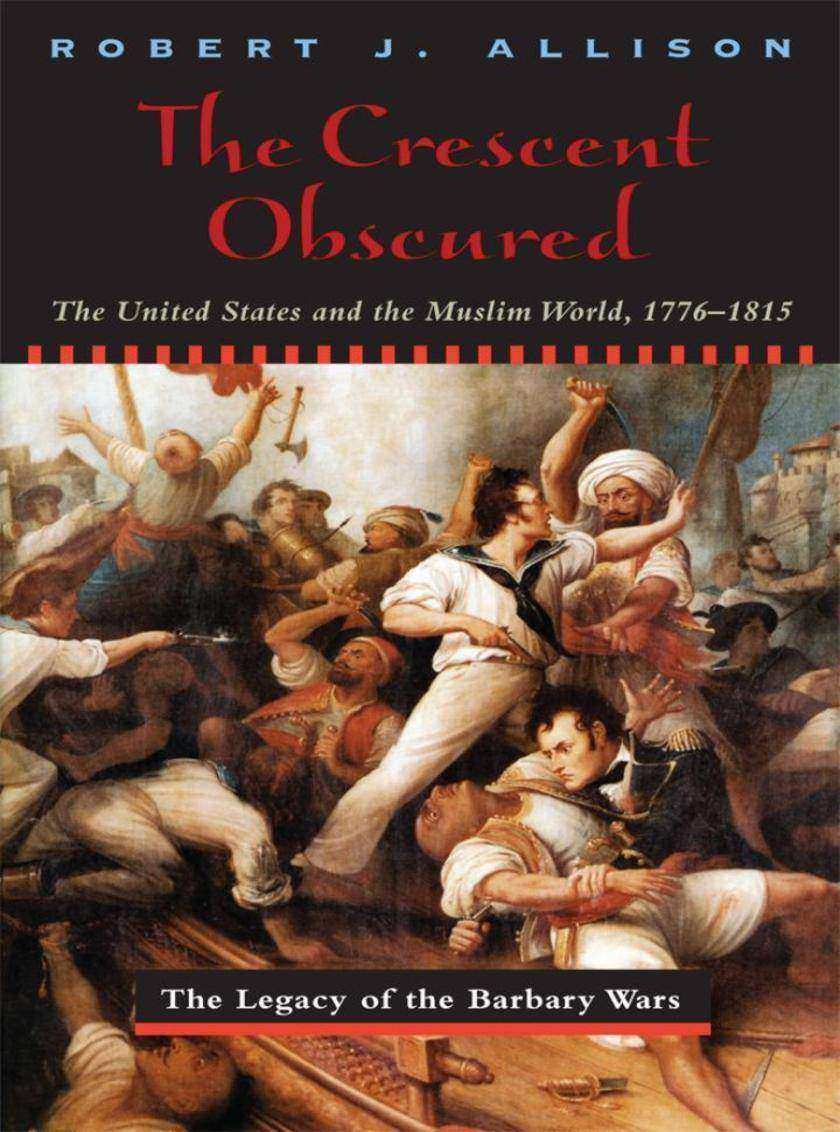
Crescent Obscured
¥241.33
From the beginning of the colonial period to the recent conflicts in the Middle East, encounters with the Muslim world have helped Americans define national identity and purpose. Focusing on America's encounter with the Barbary states of North Africa from 1776 to 1815, Robert Allison traces the perceptions and mis-perceptions of Islam in the American mind as the new nation constructed its ideology and system of government."e;A powerful ending that explains how the experience with the Barbary states compelled many Americans to look inward . . . with increasing doubts about the institution of slavery."e; -David W. Lesch, Middle East Journal"e;Allison's incisive and informative account of the fledgling republic's encounter with the Muslim world is a revelation with a special pertinence to today's international scene."e; -Richard W. Bulliet, Journal of Interdisciplinary History"e;This book should be widely read. . . . Allison's study provides a context for understanding more recent developments, such as America's tendency to demonize figures like Iran's Khumaini, Libya's Qaddafi, and Iraq's Saddam."e; -Richard M. Eaton, Eighteenth Century Studies




 购物车
购物车 个人中心
个人中心



